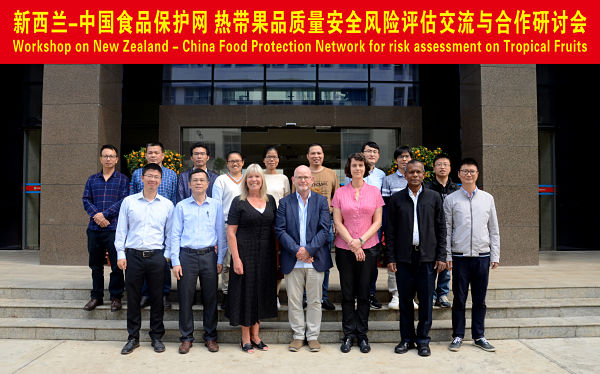Centre director, Nigel French, led a delegation of NZ scientists to attend a workshop and field trips in Hainan and Nanning, China, 12-15 March: Dr Thiagarajah Ramilan (Massey University), Dr Yun Duan (the Centre’s visiting scholar), Dr Melanie Davidson (Plant & Food Research), and Centre Manager, Wendy Newport-Smith.
The purpose of this workshop, organised by the NZ China Food Protection Network, was to encourage the development and use of Integrated Pest Management strategies to reduce or eliminate pesticide residues. It was one of the Network’s initiatives to collaborate with China on food safety science and research for mutual benefit. The workshop explored the causes behind the evidence for the identified chemical residues, which are many and complex, requiring understanding of the social as well as environmental contexts.
For example, in the current market for mango in China, large and spotless mangoes are favoured by consumers. This requirement may drive the application of unnecessarily high levels of pesticides. So the consumers have an influence on the pesticide application decisions, and thus food safety may be compromised for cosmetic appeal. Growers have different levels of education, knowledge, and awareness of the safety issues around pesticide use. Most growers are more concerned with fruit yield and spotless appearance than safety. Calendar chemical spraying is normally the first choice to control the pests and pathogens, whereas as alternative approaches may be as effective and yet safer. Pest resistance can occur when pesticides of similar modes of action are used with high frequency. There is a knowledge gap concerning the combined food safety risks associated with the application of multiple pesticides.
See the full report of the workshop presentations here

